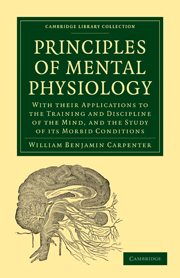 Principles of Mental Physiology
Principles of Mental Physiology Book contents
- Frontmatter
- PREFACE
- Contents
- BOOK I GENERAL PHYSIOLOGY
- BOOK II SPECIAL PHYSIOLOGY
- CHAPTER X OF MEMORY
- CHAPTER XI OF COMMON SENSE
- CHAPTER XII OF IMAGINATION
- CHAPTER XIII OF UNCONSCIOUS CEREBRATION
- CHAPTER XIV OF REVERIE AND ABSTRACTION:—ELECTRO-BIOLOGY
- CHAPTER XV OF SLEEP, DREAMING, AND SOMNAMBULISM
- CHAPTER XVI OF MESMEBISM AND SPIRITUALISM
- CHAPTER XVII OF INTOXICATION AND DELIRIUM
- CHAPTER XVIII OF INSANITY
- CHAPTER XIX INFLUENCE OF MENTAL STATES ON THE ORGANIC FUNCTIONS
- CHAPTER XX OF MIND AND WILL IN NATURE
- APPENDIX. DR. FERRIER'S EXPERIMENTAL RESEARCHES ON THE BRAIN
- INDEX
CHAPTER X - OF MEMORY
Published online by Cambridge University Press: 29 August 2010
- Frontmatter
- PREFACE
- Contents
- BOOK I GENERAL PHYSIOLOGY
- BOOK II SPECIAL PHYSIOLOGY
- CHAPTER X OF MEMORY
- CHAPTER XI OF COMMON SENSE
- CHAPTER XII OF IMAGINATION
- CHAPTER XIII OF UNCONSCIOUS CEREBRATION
- CHAPTER XIV OF REVERIE AND ABSTRACTION:—ELECTRO-BIOLOGY
- CHAPTER XV OF SLEEP, DREAMING, AND SOMNAMBULISM
- CHAPTER XVI OF MESMEBISM AND SPIRITUALISM
- CHAPTER XVII OF INTOXICATION AND DELIRIUM
- CHAPTER XVIII OF INSANITY
- CHAPTER XIX INFLUENCE OF MENTAL STATES ON THE ORGANIC FUNCTIONS
- CHAPTER XX OF MIND AND WILL IN NATURE
- APPENDIX. DR. FERRIER'S EXPERIMENTAL RESEARCHES ON THE BRAIN
- INDEX
Summary
340. There is no part of our purely Psychical activity, the relation of which to Physical conditions is more obvious and more intimate, than that reproduction of past states of consciousness, which, when supplemented by the recognition of them as having been formerly experienced, we call Memory. It is now very generally accepted by Psychologists as (to say the least) a probable doctrine, that any Idea which has once passed through the Mind may be thus reproduced, at however long an interval, through the instrumentality of suggestive action ; the recurrence of any other state of consciousness with which that idea was originally linked by Association, being adequate to awaken it also from its dormant or “latent” condition, and to bring it within the “sphere of consciousness.” And as our ideas are thus linked in “trains” or “series,” which further inosculate with each other like the branch lines of a railway or the ramifications of an artery, so, it is considered, an idea which has been “hidden in the obscure recesses of the mind” for years—perhaps for a lifetime,—and which seems to have completely faded out of the conscious Memory (having never either recurred spontaneously, or been found capable of recall by volitional Recollection), may be reproduced, as by the touching of a spring, through a nexus of suggestions, which we can sometimes trace-out continuously, but of which it does not seem necessary that all the intermediate steps should fall within our cognizance.
- Type
- Chapter
- Information
- Principles of Mental PhysiologyWith their Applications to the Training and Discipline of the Mind, and the Study of its Morbid Conditions, pp. 429 - 470Publisher: Cambridge University PressPrint publication year: 2009First published in: 1874


